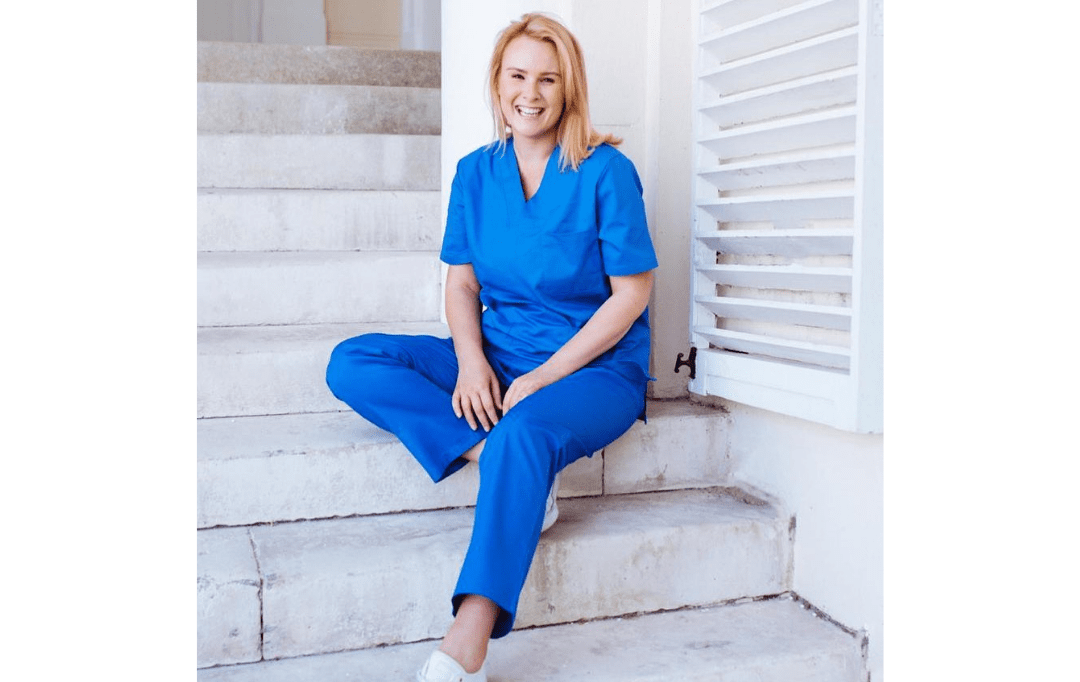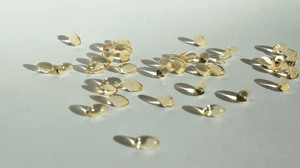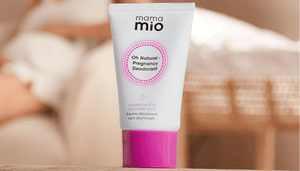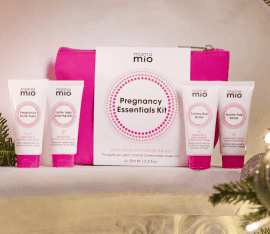Now you're 3 months into your 9 month str-e-tch, hopefully your morning sickness is starting to calm down, your energy is making a comeback and you can start beginning to prep for your birth! We spoke to Midwife Vic from The British Birthing Academy and created your ultimate guide to the 2nd Trimester.
Keep reading to discover how your fetus is developing, common symptoms in the 2nd trimester and how you and baby can stay fit and healthy...How Does The Fetus Develop In The 2nd Trimester?
The second trimester is an exciting time in pregnancy, as everything starts to feel a little more real, with your bump starting to be visible and your baby's heart rate audible at your midwife appointments.
Your baby will already have developed functioning organs, nerves and muscles, and now it will start to develop the systems that these essential foundations support.
You can expect your baby to start to produce urine, as well as develop small grooves in their skin that will make up their unique finger prints. They will also develop fine hair, that will cover the entirety of their little bodies, called lanugo, as well as a thick waxy coat called vernix. Both of these things help to keep them warm and protect your baby's skin from the constant exposure to the water they’re floating in.
Although your baby is spending much of its time asleep, they will have periods of wakefulness, as the brain develops and they start to respond to stimuli such as your voice.
You’ll also start to notice kicking as the baby starts with light little moves, that slowly gain strength and momentum towards the end of your second trimester.
What Changes Can I Expect In The 2nd Trimester?
Women often report that they feel re-energised and well in the second trimester, with typically a decrease in nausea and tiredness and an increase in energy.
However there are still huge physical changes to be expected at this point in pregnancy, with both your breasts and belly increasing in size. This is due to the important pregnancy hormones that are prepping your body for baby, as well as a growing uterus making space for your growing baby.
Due to this increase in size, skin is often stretched and can sometimes feel itchy. Using a naturally fragranced tummy oil such as the Mama Mio Tummy Rub Oil can nourish and aid your skin to gently stretch alongside your growing bump.
Other skin changes may include stretch marks, as well as the presence of your linea nigra, a dark line that stretches from your pubic bone to around your belly button.
With a renewed sense of energy, you may find the second trimester a good time to start prepping for your birth, looking at antenatal classes, as well as key bits and bobs for your nursery, bathroom and eventually hospital bag.
It’s important to note that some women may find this time difficult or find themselves increasingly anxious. If this happens, you may find a Hypnobirthing course, or guided relaxations help to make you feel informed and calm. You can always talk to your midwife or doctor as well who can refer you for further support.
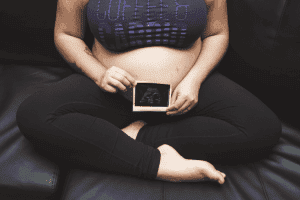
What Are Braxton Hicks Contractions? What Are The Symptoms And Treatment Options?
Not all women report being aware of their Braxton Hicks, but if they do, this tends to occur in the second or third trimester.
Braxton Hicks refers to the uterine muscles tightening and then releasing. This may feel uncomfortable but it shouldn't be painful. They are often irregular in length and strength and do not progress to be painful nor do they have a pattern. They can often occur following
exercise, a full bladder, intercourse or dehydration, however sometimes they are just a little random and surprise you.
They act as practice contractions but unlike the real thing, they won't cause any cervical change, and they won’t progress to become regular contractions.
If you experience them, try changing position, drinking some water or taking a warm bath. It is advisable to contact your local maternity unit if they progress into a pattern, increase in intensity, or are paired with any other changes such as your water popping, any bleeding or any concern about your baby’s movements.
What Is Gingivitis?
Due to the pregnancy hormones women may develop sore or swollen gums. This is because of a build up of plaque on their teeth and is best treated by practising good oral hygiene. If you are vomiting in early pregnancy, try washing your mouth with water after each vomit to avoid the acid having any impact on your teeth. If you experience any gum or teeth issues in pregnancy, it is advisable to see a dentist who can offer you advice and treatment options.
How Can I Start Preparing For Birth In The 2nd Trimester?
This is the perfect time to start thinking about your knowledge base for labour, birth and after your baby has arrived. Alongside your routine midwife or doctor appointments, you can also start to look at birth education courses. Knowledge really is power in pregnancy and birth, and the more you understand the less you will fear.
Prepping for your birth can be divided into two. Mental Prep, focusing on knowledge, relaxation and empowerment for your birth choices and preferences, and Physical Prep.
Physical Prep will often be covered in a good Birth Ed course, and this can include pregnancy yoga, understanding how to use your pelvis in labour, perineal massage and much more.
Hypnobirthing is an excellent type of course to consider in pregnancy, as it covers both of these things. The use of Hypnotherapy in pregnancy is science and psychology based, and examines the link between our brains, our hormones and the impact they have on our physical body. Trust me - it works! I have been teaching Hypnobirthing for many years now and the difference it makes for all types of birth, inclusive of c-section and vaginal births is significant.
Your birth experience will stay with you for the rest of your life. Carve out the time and commitment to making sure you stack the odds in your favour for a calm birth by investing time and space to learning this stuff- it really matters!
How Can I And My Baby Stay Healthy In The 2nd Trimester?
Healthy eating is key during this trimester, and nutritious foods help promote your babys growth and development. It’s particularly beneficial to eat foods rich in omega 3 fats as this helps your baby’s brain development.
Exercise is also helpful, and any activity you did before can be continued with variations for pregnancy. If you didn’t exercise much before pregnancy, take it slow to start with you can also benefit from regular activity. Imagine prepping for a marathon but labour is your marathon race. The more you exercise your muscles, including your pelvic floor, the more they’ll be ready for the ‘race’.

Are There Any Essential Vitamins I Should Take?
You will get most of your essential vitamins and minerals from a healthy and varied diet, however in the UK, it is also recommended you take vitamin D daily. Vitamin D helps with your baby’s bones, teeth, kidney, heart and nervous system to develop.
Which Exercises Are Good For The 2nd Trimester?
Any exercise you did pre-pregnancy can be continued, with pregnancy safe variations thrown in if necessary. Utilising experts in their field is always beneficial and there are lots of exercise professionals with specific training in pregnancy and postnatal exercise which you may find beneficial.
Walking and other low impact exercise such as swimming can be beneficial and also help to take the weight of your growing bump if you are uncomfortable.
Pregnancy Yoga is incredibly helpful as you physically prep your body for birth, aiding your muscles through gentle stretching and movement, as well as learning controlled breathing techniques which can help in labourl
How Can My Skin Change In The 2nd Trimester?
Fingers crossed you get the ‘pregnancy glow’ but in reality some women face anything from pregnancy acne, to spider veins with either very oily or very dry skin cropping up as well. Pregnancy hormones are to blame, causing your pores to excrete excess oil.
In addition your growing breasts and bump can cause the skin to stretch as it accommodates your growing baby. This can cause stretch marks for some women and sometimes itchiness. More rarely women can develop a condition called PUPPP ( pruritic urticaria and plaques of pregnancy) which often presents on the bump as an itchy and irritating rash.
What Kind Of Products Should I Be Using On My Skin In The 2nd Trimester?
Naturally fragranced products are best in pregnancy, as any obscure ingredients can be absorbed through the skin into your body. Both oils and creams can help nourish your skin as it stretches and changes and there is a good amount of evidence based research out there to support perineal massage in pregnancy lowering the incidence of tearing during birth. Perineal massage refers to perineal tissues being massaged and gently stretched in the lead up to birth .
Top Tip- if you are experiencing any heat rash, or particularly itchy skin, pop your pregnancy safe skincare products in the fridge to indulge in a cool and refreshing application.
2nd Trimester Essentials
Ready to take on the 3rd Trimester? Real Mama Sarah takes you through her survival guide, here!
